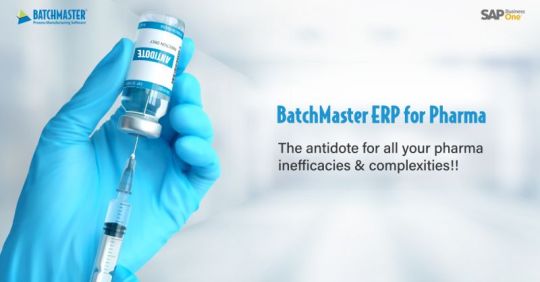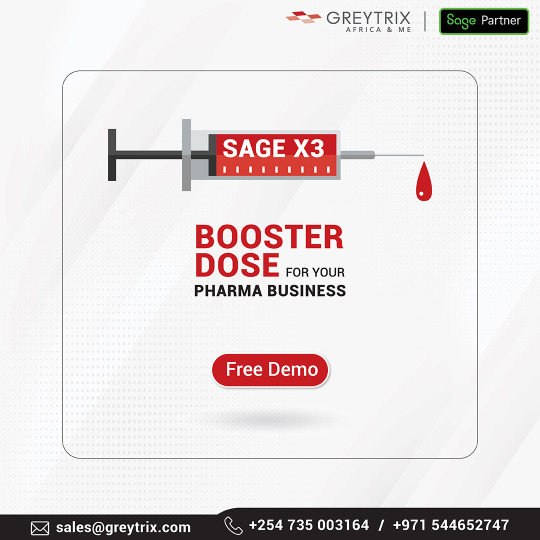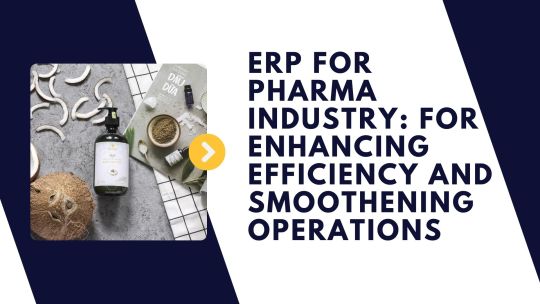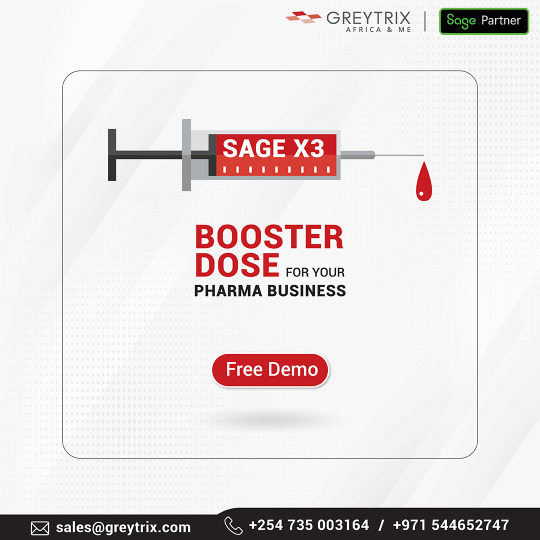#ERP for pharmaceutical
Explore tagged Tumblr posts
Text

To sustain, survive, and thrive amid the fierce competition prevailing in the pharmaceutical sector, manufacturers must make sure that their production processes are efficient in order to bring drugs into market more quickly and economically than competitors. Get Pharmaceutical ERP Software to stay on top.
0 notes
Text
How Can Pharma ERP Software Help Streamline Compliance and Production?

Pharmaceutical companies play a crucial role in producing life-saving drugs for patients. However, even minor oversights can have severe consequences, potentially endangering lives.
There have been several real-world instances of compliance and production failures within the pharmaceutical industry. One such example is the UK-based company, ITH Pharma.
In 2014, this pharmaceutical firm was found guilty of supplying contaminated intravenous feed for neonatal care, which resulted in blood poisoning in approximately 16 infants. The company admitted its failure to prevent contamination and was fined €1.2 million.
(Source: The Guardian)
What Defines a Compliant Pharmaceutical Product?
In the UK, a pharmaceutical product is deemed compliant if it:
Adheres to Good Manufacturing Practice (GMP) under MHRA regulations.
Has approval from relevant authorities, such as the MHRA or EMA (if applicable).
Successfully passes quality inspections, including batch release and pharmacovigilance.
Features accurate and compliant labelling, including Braille, where required.
Maintains complete documentation, covering batch records and recall procedures.
Complies with the Falsified Medicines Directive (FMD) or UK serialisation regulations.
These stringent compliance requirements make pharmaceutical manufacturing highly complex. Companies must ensure their supply chains adhere to the differing regulations between Great Britain and Northern Ireland. However, in addition to regulatory compliance, they must also maintain efficient production volumes to remain competitive.
To achieve both compliance and operational efficiency, pharmaceutical manufacturers need a robust ERP system. Let’s explore how pharmaceutical ERP software streamlines these crucial aspects.
How Pharmaceutical ERP Software Ensures Regulatory Compliance
Pharmaceutical manufacturers must comply with strict regulations enforced by authorities such as:
MHRA (Medicines and Healthcare Products Regulatory Agency)
GPhC (General Pharmaceutical Council)
EMA (European Medicines Agency)
These regulations govern every stage, from production to distribution. A pharmaceutical ERP system integrates compliance features into business workflows, ensuring adherence to all relevant regulations. Here’s how:
1. Enforcing Role-Based Access Control
A pharmaceutical ERP in the UK ensures strict user access controls, allowing only authorised personnel to perform critical tasks or access sensitive data. This minimises the risk of unauthorised actions and maintains data integrity.
2. Ensuring Precise Labelling
Incorrect labelling can result in legal penalties, product recalls, and patient harm. ERP software automates label generation, ensuring compliance with UK and global standards. This includes essential product details such as batch number, expiry date, and storage instructions, facilitating quick identification during recalls.
3. Creating a Quality-Controlled Environment
Pharmaceutical ERP software enables end-to-end traceability for raw materials, intermediates, and finished goods. It helps manufacturers implement quality checks across the supply chain, ensuring regulatory compliance. With real-time tracking and defined quality parameters, the system ensures that both processes and products meet strict quality benchmarks.
How Pharmaceutical ERP Software Optimises Production Efficiency
Beyond compliance, ERP software also enhances production processes in several ways:
1. Optimised Production Scheduling
Based on demand forecasting, raw material availability, and manufacturing capacity, a pharmaceutical ERP system optimises production schedules, reducing waste and improving efficiency.
2. Real-Time Inventory Management
ERP software ensures real-time inventory tracking, preventing stock shortages and minimising wastage by ensuring raw materials are used before expiry.
3. Automated Batch Processing
Pharmaceutical ERP software automates batch processing, ensuring precision, consistency, and efficiency in production. This is particularly crucial for pharmaceutical firms striving to maintain high production standards.
Choosing the Right ERP System for Your Pharmaceutical Business
Selecting the right ERP solution is critical for ensuring compliance and operational efficiency. BatchMaster UK ERP Software for pharmaceutical manufacturers is designed to address the unique challenges of the industry, providing regulatory compliance, quality control, and streamlined operations.
0 notes
Text
0 notes
Text

Pharma ERP
Sage X3 pharma ERP software enables companies to manage quality, production, supply chain operations, & regulatory compliance.
0 notes
Text
Customizing Pharmaceutical ERP Software: Top Challenges and Solutions

Pharmaceutical manufacturing is a highly regulated industry with complex processes and stringent quality standards. To effectively manage these complexities, pharmaceutical companies rely on Enterprise Resource Planning (ERP) software. However, off-the-shelf ERP solutions may not always meet the unique needs of a specific pharmaceutical organization. In such cases, customizing ERP software becomes essential.
Top Challenges in Customizing Pharmaceutical ERP Software
Complex Regulatory Compliance:
Pharmaceutical companies must adhere to strict regulatory standards like FDA, GMP, and ISO.
Customization must ensure compliance with these regulations.
Data Security and Privacy:
Protecting sensitive patient data and proprietary information is paramount.
Customization should prioritize robust security measures.
Integration with Legacy Systems:
Integrating new ERP systems with existing legacy systems can be challenging.
Data migration and synchronization must be carefully planned.
Change Management:
Implementing a customized ERP system can disrupt existing workflows and processes.
Effective change management strategies are crucial to minimize resistance and ensure smooth adoption.
Cost and Time Constraints:
Customization can be time-consuming and costly.
Careful planning and efficient project management are essential to control costs and timelines.
Solutions to Overcome Customization Challenges:
Partner with Experienced ERP Vendors:
Collaborate with ERP software development companies in India that have expertise in pharmaceutical industry requirements.
Leverage their domain knowledge and industry best practices.
Modular Approach to Customization:
Customize only the necessary modules to avoid unnecessary complexity and cost.
Prioritize features that directly address specific business needs.
Agile Development Methodology:
Use agile methodologies to break down the customization process into smaller, manageable iterations.
This approach allows for flexibility and adaptability to changing requirements.
Robust Testing and Validation:
Conduct thorough testing to ensure the customized ERP system functions correctly and meets all regulatory requirements.
Implement rigorous quality control processes.
Effective Change Management:
Communicate the benefits of the customization project and address concerns.
Provide comprehensive training to end-users.
Establish a support system to assist users during the transition.
By carefully addressing these challenges and implementing effective strategies, pharmaceutical companies can successfully customize their ERP software to achieve operational excellence.
Growthawk is a leading provider of ERP software for pharmaceutical manufacturing businesses in India. They offer tailored ERP solutions that meet the unique needs of the pharmaceutical industry, including regulatory compliance, quality assurance, and supply chain management.
By partnering with Growthawk, pharmaceutical companies can unlock the full potential of their ERP system and drive business growth
0 notes
Text
#erp#erp software#erp system#erp implementation#erp solutions#cloud erp#erp integration#erpsolutions#erp for manufacturing#erp development company#pharmaceutical manufacturing#erp for pharma#erp for distillery industry#distillery
0 notes
Text
Facilitating Connectivity and Collaboration: SS ERP MFG (Pharmaceuticals)

Integration Hub Module
Slogan: “Connect Seamlessly, Collaborate Effortlessly: Empowering Your Manufacturing Ecosystem!”
Introduction: Synthegrate Solutions proudly presents the Integration Hub Module, known as Connect, within our SS ERP MFG (Pharmaceuticals) system. This module acts as a centralized platform, fostering connectivity and collaboration among stakeholders, suppliers, and partners to drive efficiency and productivity across the pharmaceutical manufacturing ecosystem.
Client Section: Centralized repository for managing client information, facilitating transparent communication channels, and enhancing customer satisfaction and loyalty through effective client management.
Documentation Section: Robust feature for storing and organizing essential documents, ensuring easy access, retrieval, and elimination of inefficiencies associated with scattered or outdated information.
Export Capabilities: Versatile export capabilities enabling users to export data in multiple formats, such as CSV, Excel, and PDF, facilitating seamless data exchange and collaboration with stakeholders.
Printable Reports: Ability to generate printable reports directly from the system, providing quick access to essential information for meetings, presentations, or audits, with customizable settings for enhanced clarity and relevance.
The Integration Hub Module is indispensable for pharmaceutical manufacturing companies seeking to enhance connectivity and collaboration within their ecosystem. By centralizing client management, documentation, and data exchange, this module empowers businesses to streamline operations, improve decision-making, and foster stronger relationships with clients and partners. With its intuitive interface, versatile features, and seamless integration capabilities, the Integration Hub Module exemplifies Synthegrate Solutions’ commitment to delivering innovative solutions that drive success in today’s dynamic business landscape.
youtube
0 notes
Text
Discover the Future of Pharma with Zillancer’s ERP Solutions
Zillancer brings you specialized Pharma ERP solutions that transform your business by optimizing supply chains, enhancing productivity, and ensuring regulatory compliance. Let us guide your pharmaceutical company to new heights of efficiency and innovation.
#Pharmaceutical ERP#Pharma ERP Solution#ERP Pharma Software#ERP Software Pharma#ERP for Pharma Industry#ERP for Pharmaceuticals#ERP for Pharma Companies#Pharmaceutical ERP Solution#ERP for Pharmaceutical Industry#ERP Software for Pharma#Pharmaceutical ERP Systems#Best Pharma ERP Software#Pharmaceutical ERP Software#ERP System for Pharma Company#ERP Software for Pharma Industry#Pharmaceutical Manufacturing ERP#ERP for Pharmaceutical Companies#ERP Solution for Pharmaceutical Industry#ERP Systems for Pharmaceutical Manufacturing
0 notes
Text
Introducing SS ERP MFG Pharmaceuticals By Synthegrate Solutions
Welcome to the future of pharmaceuticals manufacturing! SS ERP MFG (Pharmaceuticals) is a cutting-edge management system designed to boost efficiency, precision, and compliance in the pharmaceutical industry. With a wide range of powerful modules, this system offers everything you need to streamline your operations and achieve sustainable growth.

Real-time Dashboard: Gain insights into production, performance, and key metrics at a glance.
Product & Production Management: Track products from raw materials to finished goods and optimize production workflows.
Inventory & Procurement: Streamline inventory management and procurement to prevent stockouts and minimize costs.
Sales & CRM Modules: Manage customer relationships and track sales orders for enhanced satisfaction.
Data Analytics & Insights: Leverage data-driven insights to identify trends and optimize strategies.
HR & Resource Management: Optimize workforce and resource utilization for maximum efficiency.
Compliance & Data Security: Ensure regulatory compliance with robust data protection protocols.
From managing production to improving communication and collaboration, SS ERP MFG (Pharmaceuticals) integrates seamlessly with your operations to help your business thrive in today's fast-paced industry.

For More info please Visit now: www.Synthegrate.tech
Contact Us: +923330792076
0 notes
Text
Discover how Microsoft Dynamics 365 Business Central can transform the pharmaceutical industry with its powerful features. This blog post outlines seven significant benefits of adopting this all-in-one business management solution. From streamlining operations and enhancing regulatory compliance to improving financial management and enabling better decision-making, learn how Business Central can address industry-specific challenges and drive growth in the pharma sector.
#Microsoft Dynamics 365#Business Central#Pharma Industry#Digital Transformation#Business Management Solutions#Pharmaceutical Industry#ERP Systems#Efficiency in Pharma#Regulatory Compliance#Financial Management
1 note
·
View note
Text
Erp for pharma industry: For Enhancing Efficiency and Smoothening Operations

With increasing costs and the burden of dealing with patients' information, pharmaceutical manufacturers are always on the lookout for different ways to be efficient. One such solution that is nowadays adopted more and more is best erp for pharmaceutical industry.
Enterprise Resource Planning has multi-dimensional roles for pharmaceutical operations. In real practice, pharma ERP software is a suite of integrated applications delivered as software service, which helps centralize and integrate data coming from business processes that entail manufacturing, vendor cost management, accounting systems, supply chain visibility, raw material management, procurement, inventory management, and compliance management pharma erp.
In a pharmaceutical company talking about Mej ERP AI is provide best pharmaceutical services for all users so i suggest you please freely register Mej ERP AI, an ERP system controls all critical functions and delicate operations of manufacturing drugs. They optimize manufacturing right from the pre-formulation management to raw materials and formulation. A well-designed ERP can also handle clinical trial arrangements, expiry management, batch tracking, and quality assurance while ensuring stringent regulations are followed across countries. ERP systems break down data silos, enhance data accessibility, improve patient care, streamline operations, and reduce costs erp for pharma industry.
ERP Replacement Drives Growth
A biopharm company that anticipated fast growth needed a new ERP system for optimized management. Ultra Consultants helped find a solution tailored to meet the requirements of an ERP.
What is ERP, and how does it work in Pharmaceutical Companies?
The erp for pharmaceutical serves as the glue binding together data from various departments within the pharma company, helping to make better decisions and to integrate information. The ERP system of a pharmaceutical or medical device company will give a broad view of production, quality management, administrative processes, and financial management.
It is observed that most pharmaceutical companies' information systems are partitioned into specialized subsystems with no interoperable capability. It creates complexity, inefficiencies, and increased costs. In answer to these challenges, the pharma erp software bestows one umbrella under which all data and relevant processes are integrated with seamless operations, added collaboration, and improvisation to the patient.
Challenges in Pharmaceutical Industry
There are several factors pharmaceutical erp software that hamper the productivity and growth of the pharmaceutical manufacturing sector. Some of these are mentioned below:
Changing Government Regulations
Government regulations in the software for pharma industry are dynamic. Compliance is essential to the safety of products, market access, and the safety of consumers. Among the drug and healthcare reforms to the quality standards and practices at an international level, the regulatory environments of pharma companies in operation are faced with a lot of complexities. There is a danger of losing products in the market, regulatory actions, fines, and reputational damage to companies in case they do not comply.
Supply Chain Disruptions
The erp software for pharmaceutical industry chain is very complex with numerous suppliers and distributors. Disruption of such supply chains has great effects on the health of patients, public trust, and business performance. Companies must be able to manage a plethora of uncertainties, from the supply of raw materials and transportation challenges to unplanned events—be it natural disasters or pandemics. Coordination and visibility are both key.
Quality Control
Quality control in the pharmaceutical industry is very stringent. It additionally expects manufacturers to achieve robust standards so that products can ensure safety, efficacy, and compliance. Involving extensive testing, inspections, and documentation, quality control could become very hard to handle through manual operation or by using an old system.
Inventory Management
Pharma companies handle inventory items in many diverse kinds with special storage and handling requirements. Effective inventory control or management will thus ensure that the inconvenience of stockouts is avoided, waste is reduced to a minimum, and delivery time is within schedule. On the other hand, manual inventory processes are time-consuming, prone to error, and inefficient, increasing costs and causing operational problems.
Shortage of Skilled Labor
The pharmaceutical industry requires a highly skilled workforce to drive innovation, compliance, and great product quality. Therefore, there is an acute shortage of skilled labor, making it difficult to attract and retain the best talent. Manufacturers have to invest in training and human resource optimization to maximize output.
How ERP Software Helps Pharma Companies Overcome Challenges
Such pharmaceutical manufacturing software can help companies overcome these challenges and optimize their operations. Here's how ERP software can help your pharma company:
Regulatory Compliance Management
The ERP system offers a single platform to deal with and monitor regulatory compliance. Besides, it automatically looks after adherence to quality standards, traces the changing landscape of regulatory requirements, and ensures easy documentation and reporting. ERP software automates the compliance process and diminishes the risk of non-compliance, making auditing easier and less time-consuming.
Efficient Inventory Management.
A pharma ERP system automatically simplifies inventory management, as it gives visibility in real time regarding stock level, expiration, and batch number. It allows one to forecast demand accurately and automatically replenish while optimizing storage and distribution. Generally, ERP software results in very few outages of stock, low carrying cost, and improved total inventory control.
An ERP system in pharmaceutical manufacturing integrates various functions and processes like formulation management, production planning, and quality control. This eliminates manual activities and provides errorless outputs, thereby enhancing the efficiency of operations. The manufacturing capabilities are tuned well, to optimize and scale, and efficiently handle the productions needs using the ERP software system.
Improved Quality Control
An ERP system is, therefore, of great importance in quality control by capturing and analyzing data at every stage of the manufacturing process. This will involve real-time monitoring of quality parameters, automation of quality control processes, and deviation management.ERP software assists in maintaining detailed and accurate records of quality as well as tracking nonconformities through maintianace of compliance in that dimension.
Optimal Supply chain management
A good ERP system offers visibility and control across the pharmaceutical chain, making procurement, inventory, order fulfillment, and real-time collaboration with the suppliers and distributors efficient. On top of that, it facilitates track-and-trace features that optimize procurement, makes demands better, and improves tracing of both forward and backward goods. Financial Management and Cost Control
An enterprise resource planning system assimilates and streamlines financial data while automating the accounting process. It thereby accurately generates each and every report. It allows for the best financial planning, computation, and budgeting. Consequently, it results in informed decision-making and effective control over costs. The ERP system optimizes the financial management process, including improving accounts payables, better availing of receivables, and improving general financial effectiveness.
Benefits of ERP Software to the Pharma Industry
Here are a few benefits that are brought to the industry by pharma ERP software:
Effective Inventory Management
Phama ERP software ensures real-time inventory tracking, optimal stock levels, and reduced wastage or stockouts. The software provides greater traceability for the manufacturer to monitor batches, track raw materials, and guarantee compliance with regulatory bodies. This is, in fact, the visibility that can greatly reduce the potential risks of recall of a product and enhance the inventory management function.
Pharma ERP software provides automated solutions helping the company meet the regulations. It measures, tracks documentation, and supports audits. By using the ERP, companies
can assure their way through the complex maze of regulations confidently.
Streamlined Manufacturing
ERPs streamlined manufacturing, which lets the division become more operationally efficient, minimizing errors and removing production rocks. It gives efficient, optimal production capabilities and forecasts scalability and has control over uncertainties with the supply chain.
Better Quality management
ERP software incorporates quality control processes, thus boosting product traceability and thus minimizing errors, and ensuring good product consistency. ERP software supports the tracking of compliance; this will quickly manage non-compliances and keeps up very detailed records.
Better Financial Management
The ERP software consolidates financial data as it automatically keeps an operational account system and generates robust financial reporting in real-time. It eliminates manual data entry and reconciliation which was prone to error and slow.
This enhances financial planning, cost analysis and budgeting mainly because of the reports easily available
Optimal Supply Chain Management
The ERP software must be embedded with end-to-end visibility and control from the supply chain, for procurement to inventory management and order fulfillment. It further helps the firm in demand forecasting, reducing lead time and enhancing efficiency in the supply chain.
Different types of ERP Systems for Pharma Companies
There are different available types and features of the on-premise ERP systems for the pharma companies in the marketplace:
On-Premise ERP Systems
On-Premise ERP Systems: Installed and maintained at the user firm's physical location, this provides the user full control over both the data and infrastructure. Suitable for big companies, including those that employ their own IT team. Cloud-Based ERP Systems: Usually hosted on the third-party vendor's infrastructure, which provides more flexibility, scalability, and is even cheaper than the on-premise ones mentioned earlier. These are fit for small to mid-range businesses searching for ease of quick installation and non-complicated access to data. Hybrid ERP Systems: These combine on-premise and cloud capabilities in order to give the user the flexibility of on-premise customization with the.
Execution of ERP software in a pharmaceutical industry
Execution of the ERP software requires a lot of planning, customization, and in the handling of change. Important steps involved are thus:
Business needs evaluation
To determine a point of pain, specific to be addressed and functions to be included in the ERP system.
Select the right pharma ERP solution
Choose an ERP that fulfills the needs specific to the pharmaceutical industry.
Customize and configure the ERP
Tailor the ERP in close collaboration with the vendor of ERP.
Data migration and training
Plan data migration and provide appropriate training to your employees in a more comprehensive way.
Change Management
Execute proper change management policy for a smooth transition.
Continuous Improvement
Keep updating and fine-tuning the ERP system regularly to churn at their best.
Conclusion
The pharmaceutical industry is changing tremendously with growing complexities, changing regulations, and customer demands. An ERP system can help your company meet and streamline operations in dealing with needs. A pharma ERP solution will help to streamline inventory management, compliance with the regulatory body, and improve the quality of controlled products and states in the supply chain. All this can make your business operationally excellent, productive, and delivering quality medications and medical devices around the world.
0 notes
Text
Why is ERP important for the pharmaceutical industry?

In an era where precision, efficiency, and compliance drive success, the pharmaceutical industry faces unique challenges. From stringent regulatory requirements to managing complex supply chains, the need for streamlined operations is more critical than ever. This is where ERP solutions for the pharmaceutical industry in Mumbai and across India play a pivotal role, transforming the way businesses operate and ensuring they remain competitive.
What Is a Pharmaceutical ERP System?
A Pharmaceutical ERP system is a comprehensive software solution designed specifically to meet the needs of the pharmaceutical sector. It integrates various business processes such as production planning, inventory management, quality control, regulatory compliance, and sales into a single platform. By centralizing data, the system offers real-time visibility and control over operations, ensuring that pharmaceutical companies can efficiently manage their resources and maintain compliance with industry regulations.
Challenges in the Pharma Industry
The pharmaceutical industry encounters numerous challenges that can hinder operational efficiency and profitability. Here are some of the key challenges:
Stringent Regulatory Compliance: Adhering to local and international regulations, such as GMP (Good Manufacturing Practices) and FDA guidelines, is essential but complex. Non-compliance can lead to significant penalties and reputational damage.
Inventory Management: Maintaining an optimal inventory of raw materials and finished products is challenging, especially given the perishable nature of many pharmaceutical goods.
Quality Assurance: Ensuring the quality of products at every stage of the production process is crucial. Any deviation can result in recalls and financial losses.
Supply Chain Complexity: Managing a multi-tiered supply chain, including procurement, manufacturing, and distribution, requires robust coordination and real-time visibility.
Data Accuracy and Security: Handling sensitive data like clinical trial results and patient information demands a secure and reliable system.
The Role of the Best Pharmaceutical ERP Solutions Provider in India
To overcome these challenges, partnering with the best ERP software for businesses in Mumbai and India becomes essential. Here’s how these solutions can help:
Industry-Specific Expertise: They understand the unique challenges and regulatory requirements of the pharmaceutical industry.
Customized Solutions: They can tailor ERP systems to meet the specific needs of individual pharmaceutical companies.
Implementation and Support: They provide comprehensive implementation services, training, and ongoing support.
For pharmaceutical companies in India, partnering with a local provider can offer several advantages, including better understanding of local regulations and market dynamics. For businesses looking for ERP solutions in the region, there are many providers offering ERP solutions for the pharmaceutical industry in Mumbai and ERP solutions for pharmaceutical companies in India. It's essential to research and select a provider with a proven track record and expertise in the pharmaceutical sector. For businesses looking for general solutions, there are also options for Best ERP software for businesses in Mumbai.
By implementing a robust pharmaceutical ERP system, companies can streamline operations, improve compliance, enhance quality control, and gain a competitive edge in the market.
Why Choose ERP Solutions for Pharmaceutical Companies in India?
Implementing ERP solutions for pharmaceutical companies in India offers numerous benefits. It not only helps businesses stay compliant and efficient but also provides a competitive edge. For companies based in Mumbai, leveraging the best ERP software for businesses in Mumbai ensures tailored solutions that address local and global challenges effectively.
In conclusion, ERP systems are indispensable for the pharmaceutical industry, offering the tools needed to tackle its unique challenges. By choosing the right ERP solutions provider, pharmaceutical companies can optimize their operations, ensure compliance, and drive sustainable growth.
0 notes
Text

Pharmaceutical ERP Software
Sage X3 pharmaceutical ERP software enables companies to manage quality, production, supply chain operations, & regulatory compliance.
#greytrix middle east#erp software#sage erp#sage x3#pharmaceutical industry#pharmaceutical#pharma industry
0 notes
Text
Enhancing Workforce Management and Productivity in the Pharmaceutical Industry with ERPNext
In the fast-paced and highly regulated pharmaceutical industry, efficient workforce management and enhanced productivity are crucial. ERPNext for Pharma offers a comprehensive solution that integrates functions such as inventory management, supply chain operations, and compliance tracking, ensuring streamlined operations and regulatory adherence. By leveraging ERPNext, pharmaceutical companies…
#ERP For Pharma#ERPNext for Pharma#ERPNext Pharma Software#Pharma Business Success#Pharma ERP#Pharma Inventory ERP#Pharmaceutical Industry
1 note
·
View note
Text
The Essential Features of Pharma ERP Software

Recently, a friend of mine, who owns a pharmaceutical company in the United Kingdom (UK), and I planned to meet for coffee. However, as usual, he got caught up with work and arrived late. When I asked him why his work seemed so chaotic, he explained that managing all the departments and the entire production scale in the pharmaceutical business is inherently challenging. I introduced him to the concept of ERP software as a potential solution to his supply chain management woes.
He was surprised to learn that an ERP solution could digitalize all supply chain operations and assist in simplifying processes, boosting efficiency, and improving productivity in his pharmaceutical company. Upon this, he asked what features should be looked for or what features an ideal pharma ERP software should have. Below is the list of six most important features that can’t be compromised while selecting a Pharma ERP:
1. Formulation/Recipe Management
Formulation management is crucial in the pharma industry, as a manufacturer's success depends on effective formula control, security, and tracking. ERP for pharma allows manufacturers to document every detail of each ingredient and its use in the production process. It tracks ingredient specifics, stores formulations securely, and incorporates an approval workflow for added security. It also ensures that only authorized personnel can access the formulas.
2. Batch Processing
Pharma manufacturing is performed in batches according to cGMP guidelines. Manufacturers need an manufacturing ERP that handles the entire product line, including tablets, powders, capsules, and syrups. It should seamlessly manage the entire production process from batch creation to closure, including ticketing and cost calculation for materials, labor, and other expenses. Additionally, the ERP should be capable of printing BMR and MBR reports, monitoring batches, dynamically sizing them, and executing SOPs.
3. Quality & Regulatory Compliance
A good pharma ERP ensures compliance with FDA 21 CFR, EU GMP, WHO GMP, and other standards. It includes workflows, approval controls, and audit trails to simplify compliance. It features quality assurance (QA) and quality control (QC) capabilities, along with stability testing, to ensure the safety of drugs reaching consumers.
ERP for the pharmaceutical industry should support QA testing, document the entire process and the outcome of each test, eliminate even the slightest slip-ups, and ensure conformance with expected standards. Well-defined QA and QC roles and compliance with cGMP mean that only the appropriate materials are sent for production or shipment while the inappropriate ones are rejected and quarantined, returned, or disposed of. NC, CAPA, Inspection plans, Adverse Event Reporting, etc., are other features that cannot be missed in a Pharma ERP solution.
4. Lot Traceability
A pharmaceutical ERP system with lot traceability features enables manufacturers to track ingredients throughout the entire supply chain, from procurement to final sale and vice versa. This capability facilitates efficient management of recall situations and enables swift product recalls when necessary. It also allows the execution of mock recalls. By providing a 360-degree view of each product lot's activity, the ERP system ensures that each lot remains distinct and traceable in all subsequent operations.
5. Inventory & Material Management
A reliable ERP for pharma industry enables manufacturers to minimize material wastage and monitor inventory levels effectively, ensuring greater profit margins. It facilitates identifying required materials, setting procurement triggers, and scientifically monitoring material usage. Additionally, it reconciles inventory balances and generates inventory status reports promptly. By calculating production and procurement needs, the system optimizes inventory levels to prevent overstocking or understocking. Furthermore, it supports the first expiring, first out (FEFO) approach to inventory management, ensuring consistent quality and minimizing the risk of selling expired products.
6. Procurement and Sales
The Pharma manufacturing software must support the entire Procurement and Sales cycle. Starting with opportunity maintenance, tracking, and analysis, to quote creation, order generation, picking, packing, shipping, and invoicing. It should allow applying different types of discounts, promotional offers, sales kits, etc., while also calculating country/state-specific taxes.
In the case of Procurement, manufacturing ERP software should maintain vendor details and certifications, suggest the best vendor based on quality, cost, lead times, etc., and should alert when a vendor certification is expiring. It should also digitize the quote-to-receiving process followed by the generation of Vouchers.
Conclusion
These are six major features that are MUST-HAVE for pharma manufacturing ERP Software. One such ERP software that encapsulates all these capabilities under its umbrella is BatchMaster ERP for UK Pharmaceutical industries. Tailored specifically for pharmaceutical industries, BatchMaster ERP offers a comprehensive solution designed to meet the unique needs of the sector.
0 notes